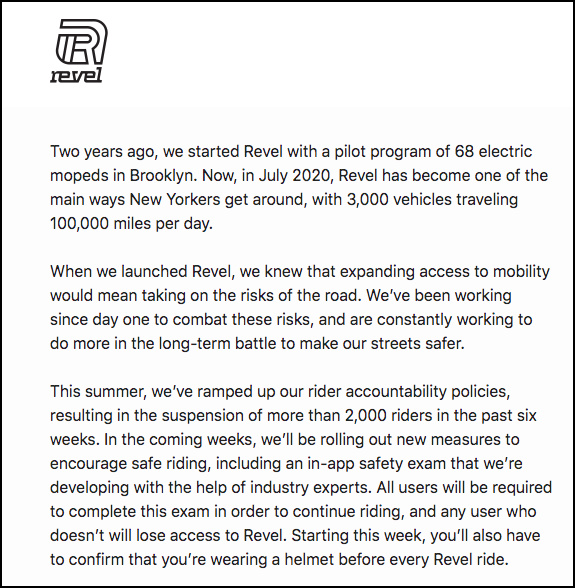They knew they had a problem, and didn't act quickly enough.
The owners of Revel — the scooter company that has been put out of business in New York City due to two recent deaths, several high-profile injuries and a handful of lawsuits — were well aware that their increasingly popular service was running into trouble, and even sent an email to all their customers warning that new safety measures were on the way.
But they didn't come in time. Two days after the July 26 letter, the company voluntarily suspended its service amid pressure from Mayor de Blasio, who said this "new technology" hadn't proven it could be safe.
The company email said Revel would institute a mandatory, in-app safety exam, plus install software that would confirm that customers were "wearing a helmet before every Revel ride."

Those recommendations came out of a safety report Revel commissioned, and quietly published online in June, that studied rider behavior during 884,910 Revel rides in the second half of 2019. Among the findings were that Revel riders drove the scooters, which top out at 30 miles per hour, an average of 12.3 miles per hour and that there were 155 crashes that ended in injury or property damage — a rate of one crash per 5,700 rides.
Of those crashes, 30 percent of those crashes were attributed to people who had used Revel five times or less.
Sarah Kaufman, one of the report's authors, recommended that Revel, at the very least, make the optional "how-to" videos mandatory for new riders.
But the report also suggested Revel should institute mandatory in-person lessons for new riders who didn't have motorcycle experience. The scooters are legally defined as Class B scooters, a classification that means users don't need a specific motorcycle license to use them.
"[Mandatory lessons] are key to getting people to use micromobility more safely," Kaufman, a transportation and technology researchers. "People would have an easier time figuring out the vehicle and the nuances to riding a moped like with turning, for example."
One Revel power user told Streetsblog that she didn't take the free, in-person class that Revel offers, but she did review the way the scooter worked with a friend who had motorcycle experience, suggesting that some initial familiarity is crucial for new riders.
"My first experience on a Revel was with a friend who's a motorcycle owner, and he sat down with me and explained things like how to use the throttle and how to take turns," said Konstancja Maleszynska, a Greenpoint resident who's taken 150 Revel rides since August. "After five minutes, I felt confident to ride home from where I was."
Kaufman said that the company was receptive to the critiques and recommendations in the report, which even involved faulting Revel for picking a low-visibility color scheme — blue and black — that was linked to crashes.
The recent email to users explaining upcoming safety upgrades was based on what came out of the company's own safety report, but a spokesperson for Revel did not explain how it went from promising those features in a matter of weeks to shutting down entirely two days later. Mayor de Blasio told reporters on Wednesday said that Revel made its own decision to shut down, but that it also came after multiple conversations with the administration after the high-profile crashes in July.
Neither Revel nor City Hall revealed the substance of those talks, nor did either party reveal what the company talked about in previously reported conversations between Revel and the Department of Transportation.
The company was also blasted by an anonymous former employee, who told the New York Post that Revel failed to properly maintain its fleet of scooters, which the employee called "cheap" and "finicky." The former employee also said that the company brushed off an internal push to institute mandatory in-person lessons for new riders.
For users like Maleszynska, the mayor's quick trigger to critique Revel as a particularly dangerous service doesn't jibe with the reality that innocent New Yorkers are still much more likely to get annihilated by a motor vehicle than an electric scooter — and far more occupants of cars have been killed this year.
"I understand the scrutiny new modes of transportation are subjected to, but we're not grieving for the over 14,000 injuries and 51 deaths involving motorists alone so far this year," she said.
Revel Mopeds: 3 million rides, ~7.5m miles, 2 deaths, ~27 deaths per 100m miles
— Asher 🚶🏰🐌🌳🔰🧢 (@AsherDeMontreal) July 28, 2020
Citi Bike: 100m rides, 100-150m miles, 2 deaths, ~1.5 deaths per 100m miles.
NY State, Motor Vehicles: 0.76 deaths per 100m miles.https://t.co/4nktnKltGh
Still, transportation advocates aren't going to throw the towel in on the idea of electric scooter share as a transportation mode.
Kaufman, in a separate report on transportation patterns during coronavirus that was published on Wednesday, pointed out Revels racked up an average of 7,284 trips per day in May after the company offered free memberships to healthcare workers and expanded its service area into more of Queens, parts of Manhattan and the south Bronx from its original zone on the western fringe of Queens and the "brownstone belt" of Brooklyn.
"During the worst of the pandemic, many essential workers relied on Revel, and it would be a shame to see New York lose such a great option," she said.
But rent-by-the-minute scooters should not die, even if Revel doesn't survive this crisis, advocates said.
"We would love to see this type of mode thrive in New York City because people need alternatives to driving and the subways," said Transportation Alternatives spokesman Joe Cutrufo. "It doesn't matter who's operating the system as long as they can do it safely."
But, Cutrufo added, that's going to take mayoral leadership — in designing streets that are safer for all modes of transportation, and in taking on the real enemy of safety: cars and trucks.
"We would love to see the mayor take as proactive a stance towards regulating multi-ton cars and trucks as he has 200-pound scooters," he said.
Mitch Schwartz, a spokesperson for the mayor, told Streetsblog that the city had a moral obligation to keep people safe from the vehicles.
"The final decision on when Revel will be allowed to resume service rests with the city — legally and morally," said Schwartz. "We respect the growing demand for safe alternate transportation options, but rest assured, Revel won’t return to city streets without demonstrating they can keep riders, passengers, and pedestrians safe."
As of Tuesday, car drivers have killed roughly 110 people so far this year. The de Blasio administration is not considering a ban on Chevys, Fords and Chryslers.
Listen to Dave Colon on the Brian Lehrer show on Thursday, July 30 at 10:30 a.m. Click here for a live stream.






